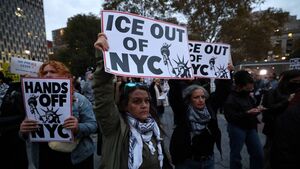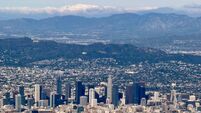The butt of Nephin and the borders of the world

People demonstrate against Immigration and Customs Enforcement (ICE) in New York last week. Picture: Timothy A. Clary/AFP via Getty Images
“Where you from, ma’am?”
The American border officer leaned over the counter, his face carved into that universal expression of officialdom - part suspicion, part indigestion.
The middle-aged housewife from Lahardane clutched her 1980s' handbag and smiled the nervous smile of someone who’s been awake for 20 hours after her first ever airplane flight and is just hoping to see her grandchildren before she dies of acute paperwork.
“Boghadoon," she said brightly, in her heavy Mayo accent.
The officer frowned.
“Where?”
“Boghadoon!” she repeated, louder this time, as though her high volume might help geography cross the Atlantic.
Still nothing. The man squinted at her form and after a long pause, drawled: “Is that… a republic in Africa?”
With rising panic and frustration vying with her tired brain shutting down, she blurted: “No! Boghadoon! Boghadoon!… at the butt of Nephin!”
The officer stared at the red-faced woman in front of him and deciding he was not going to illicit any more useful information from her, waved her through. Wherever this strange-sounding land was located, it was unlikely to be a hotbed of terrorism.
It’s an old North Mayo story, always ending with that proud, impossible phrase, “the butt of Nephin”. It captures the human confusion of trying to fit an honest life into bureaucratic categories designed by Kafkaesque committee, overseen by an all-powerful border control officer.
***
The Irish comedy trio Foil Arms and Hog perform weekly sketches which brilliantly lampoon our cultural confusions and contradictions. Their YouTube video titled 'Irish Lad at the Embassy of the USA' features a young Mayo man summoned to clarify answers on his US visa application. Decked out in a pristine Mayo GAA jersey, he faces the impassive embassy officer who asks the simplest of questions:
“When will you be leaving the United States?”
Our man scratches his head and smiles.
“Ah shure you know yerself like.”
The official blinks.
“No, sir, I do not know.”
After several rounds of mutual incomprehension, the officer finally insists: “You must leave by April 7th.”
“Grand,” says the lad cheerfully. “Shtick me down for that then - I’ll do me besht."
“Your visa has been denied," the official answers firmly.
This is an old parody, as the US has since ramped up its policing of immigration (even under Joe Biden’s administration), with Trump’s border control officers and ICE agency gaining a zero-tolerance approach to anyone failing to adhere to visa requirements - doing their “besht” or not.
***
Here in Los Angeles, I met a hard-working Armenian makeup artist with a story equal parts farce and tragedy. Four years ago, in a well-understood route, she paid smugglers thousands to get her from a Cancun hotel to the US border, instructing her to ‘loose’ her passport and there give herself up to authorities and claim refugee status, telling a story of fleeing for her safety to the USA.
She’d provided fake cosmetic-surgery photos to support a claim of persecution in Russia for being Armenian. Initially, she spent a month in detention, where no one spoke Armenian or Russian and she passed most of her time reading in the prison library.
“It wasn’t so bad," she shrugs, as though it were a long layover rather than a jail.
After a hearing, she was paroled and released. She met up with her husband, who had arrived earlier in a similar fashion. But in their applications to normalise their immigration status they pretend not to know each other, so that if one asylum claim failed, the other might succeed. She’s since had two children by him, but still tells immigration she doesn’t know who the father is.
However, six months ago, her aunt has tried to come the same way but has vanished somewhere in the system as the new administration’s policies take dramatic effect on existing pathways to enter the United States without a visa. They are very worried about her but constrained by fear in sticking out their neck with authorities.
A similar story emerged back in Mayo. A colleague told me she’d met an African woman applying for asylum who had previously worked at a major London bank. The woman admitted she was claiming refugee status based on fear of female-genital mutilation for her daughter back in Africa, whether it is true or not she is doing her “besht” to fit within bureaucratic regulations, similar to the Armenian makeup artist and her husband.
***
The Greek economist Yanis Varoufakis, speaking on the ‘Unherd’ YouTube channel on October 5, 2023, claimed that “borders are a sign of the failure of the human species”. He argued that the world was a better place before passports when Lord Byron could simply wander off to Greece, or Lord Elgin could (less nobly) wander off with the Greek marbles.
I’ve great admiration for Varoufakis, one of the few public thinkers who can make economics sound like poetry, but I think he’s stretching it here.
The late eighteenth-century world of Byron and Elgin had maybe a billion people. Today, we have nearly nine billion, sharing a planet already buckling under climate change, resource depletion and the kind of digital connectivity that makes every distant hill look not just greener, but air-brushed and air-conditioned.
Allowing everyone to move wherever they wish, whenever they wish, isn’t freedom - it’s chaos. Personally, I don’t support unrestricted movement for plants or animals, let alone people. Introduce one non-native frog or shrub in the wrong ecosystem and you’ve got disaster.
That’s not cruelty, it’s stewardship. We have to be grown-up curators of our planet, not naïve idealists skipping across borders, wishing we had the liberties of 200 years ago. Once, if small farmers and craftsmen were being oppressed by a bureaucracy they could simply move to live under more amenable leadership, or even stake out new territory, but this was often done at the expense of native cultures and societies. Our bureaucracies claim to know better now. But do they?
***
That same faith in boundless expansion and unrestricted freedom turns up again - this time dressed in more woke language - in what American liberal commentator Ezra Klein calls his new “abundance theory”.
In his 2025 book , co-authored with Derek Thompson, Klein argues that to build a better future, societies must create more of what they need - housing, clean energy, infrastructure - instead of rationing what already exists. It’s a rallying cry against political paralysis, a call to “build more” rather than “fight over less”.
But while Klein identifies as a centrist Democrat, his “abundance” optimism is really just a kinder-sounding cousin of the old Republican and neoliberal faith in perpetual growth. Both camps - the politically correct liberals and the free market fundamentalists - share a same basic blindness: the belief that human happiness depends on endless expansion or limitless freedoms.
What they miss is the moral and ecological necessity of constraint. Not the mean-spirited kind that hoards wealth, opportunity or selfishly shuts borders, but the mature kind that recognises limits as essential to harmony.
The earth cannot sustain expectations (much less delivery) of infinite abundance - not of people, not of products, not even of good intentions.
***
We don’t need scarcity or surplus; we need balance. A sustainable abundance where we live freely, but not at the expense of the world itself.
The woman from Boghadoon didn’t want to destroy America. She just wanted to see her grandchildren. The Mayo lad was chancing his arm to work illegally in the USA and his visa refusal deserved no sympathy, but also he didn’t kill anyone. The Armenian couple moved to the United States for a better life but they are not refugees in the bureaucratic sense, yet now contribute to American society, working hard to pay their way.
The tragedy is that our systems no longer know how to tell the difference.
We’ve made migration a moral sorting hat amidst political grandstanding: one side shouting “build the wall!” and the other shouting “no human is illegal!” while real people - with real stories and real needs - stand quietly in between, clutching their forms and hoping they’ve ticked the right box.
Surely countries have the right to regulate immigration as they see fit and be entitled to exclude those who flout these rules. Similarly, people deserve the opportunity to live full and happy lives to achieve their dreams. Yet both freedoms should be limited by understanding that our overcrowded and overexploited world is being destroyed by human activities in a capitalist system which benefits the rich and entitled over everyone else.
This is a three-legged stool, we need all three legs or it doesn’t work.
And doing our ‘besht’ just won’t be enough.





